Ebola nurse Pauline Cafferkey returns to Sierra Leone to lay her ghosts to rest
After volunteering to help Ebola sufferers, Pauline Cafferkey contracted the disease herself. She returns to Sierra Leone four years later to meet the survivors for the first time and see how the disease is still affecting people
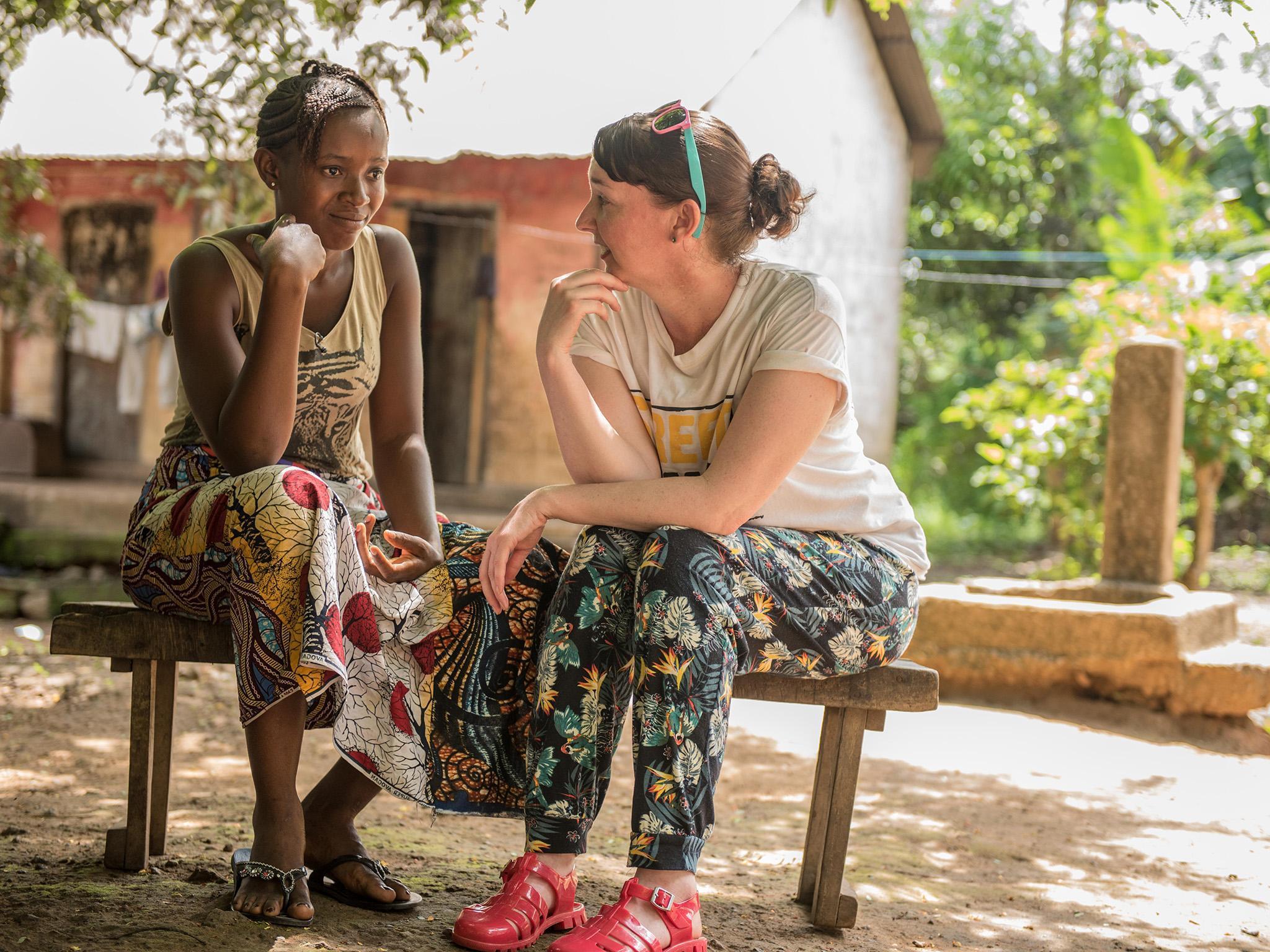
Your support helps us to tell the story
From reproductive rights to climate change to Big Tech, The Independent is on the ground when the story is developing. Whether it's investigating the financials of Elon Musk's pro-Trump PAC or producing our latest documentary, 'The A Word', which shines a light on the American women fighting for reproductive rights, we know how important it is to parse out the facts from the messaging.
At such a critical moment in US history, we need reporters on the ground. Your donation allows us to keep sending journalists to speak to both sides of the story.
The Independent is trusted by Americans across the entire political spectrum. And unlike many other quality news outlets, we choose not to lock Americans out of our reporting and analysis with paywalls. We believe quality journalism should be available to everyone, paid for by those who can afford it.
Your support makes all the difference.Scottish nurse and Ebola survivor Pauline Cafferkey has made an emotional return to Sierra Leone for the first time since contracting the deadly virus in December 2014. Pauline, who caught Ebola while volunteering at a treatment centre in Kerry Town, Sierra Leone, visited the country with UK charity Street Child and has spoken out about the terrible conditions still facing many of those struck down by the Ebola virus in Sierra Leone.
Today’s Sierra Leone looks very different to when Pauline arrived in 2014. Traffic has returned to roads that were once almost empty aside from ambulances and aid vehicles. Markets are bustling once more. But when you dig below the surface, for the worst-impacted families, things are far from back to normal. Pauline battled tears as she met survivors and orphans still facing extreme poverty, social stigma and excruciating health problems as a result of the epidemic that killed 4,000 people in 2014-15. In spite of calling the last two years of her own life ‘a whirlwind of nastiness’, she said that: ‘It would be an insult’ to compare what she had been through to the horrendous situations faced by Sierra Leone’s worst-hit survivors and orphans, like 17-year-old Mbalu.
Mbalu contracted the deadly disease while caring for her five-year-old niece. She said: ‘When my sister died I took my little niece home with me to care for her, then she started showing signs of sickness herself and died. ’
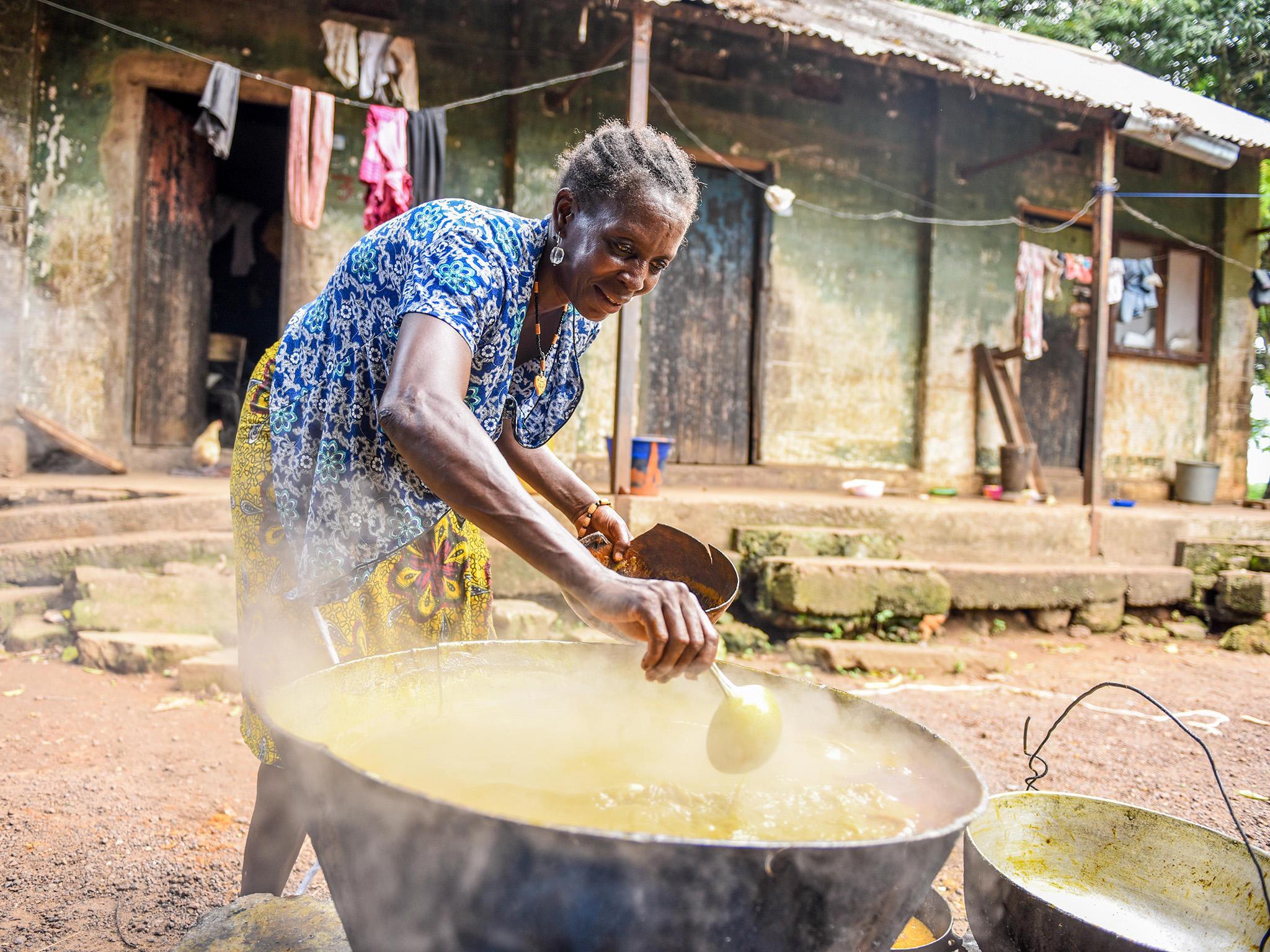
When Mbalu started feeling nauseous too she realised what it was and made the painful journey to the Ebola treatment centre on foot. Mbalu became a patient at the Kerry Town centre where Pauline worked and she remembers Pauline treating her there. Mbalu was critically ill but made a remarkable recovery from the disease that killed her father, sister, aunt and niece. She said that Pauline’s support at the treatment centre ‘made me feel happy because I was just thinking a lot. I was thinking about my father, sister and aunt - and my future, about how it would be if I survived. ’
On meeting Pauline again, Mbalu hugged her and said: ‘I feel like I’m in heaven, I see that I’m well and that Pauline is well too. ’
For Pauline, the trip was extremely emotional. Joined by former colleagues who she had worked alongside during the crisis, she watched as diggers finished demolishing the Kerry Town treatment centre, reducing the former wards where she had volunteered as a nurse to rubble. Before embarking on the trip, she had thought that revisiting the treatment centre would be the most difficult part but she said that seeing it knocked down was something of a relief. In reality, meeting Ebola orphans and survivors like Mbalu was far more distressing. Pauline said: ‘I got upset when I was listening to Mbalu struggling to talk about it [the impact of Ebola on her family], because I know it must be so hard. We had the same virus but our similarities stop there,’ said Pauline. ‘I had world-class treatment and she didn’t. Meeting Mbalu was hard. It was my first time meeting a survivor in this country. I guess it was that first exposure - like when you’re a nurse and you come across your first death. ’
The legacy of Ebola is still very real for children like Mbalu. She hasn’t been in school for two years since Ebola took her father, the family’s breadwinner. Her mother’s meagre earnings are not enough to afford school materials. Her mother said: ‘I feel so awful that Mbalu cannot go to school, I haven’t been able to send her because we don’t have enough money. I barely make enough to feed us. ’
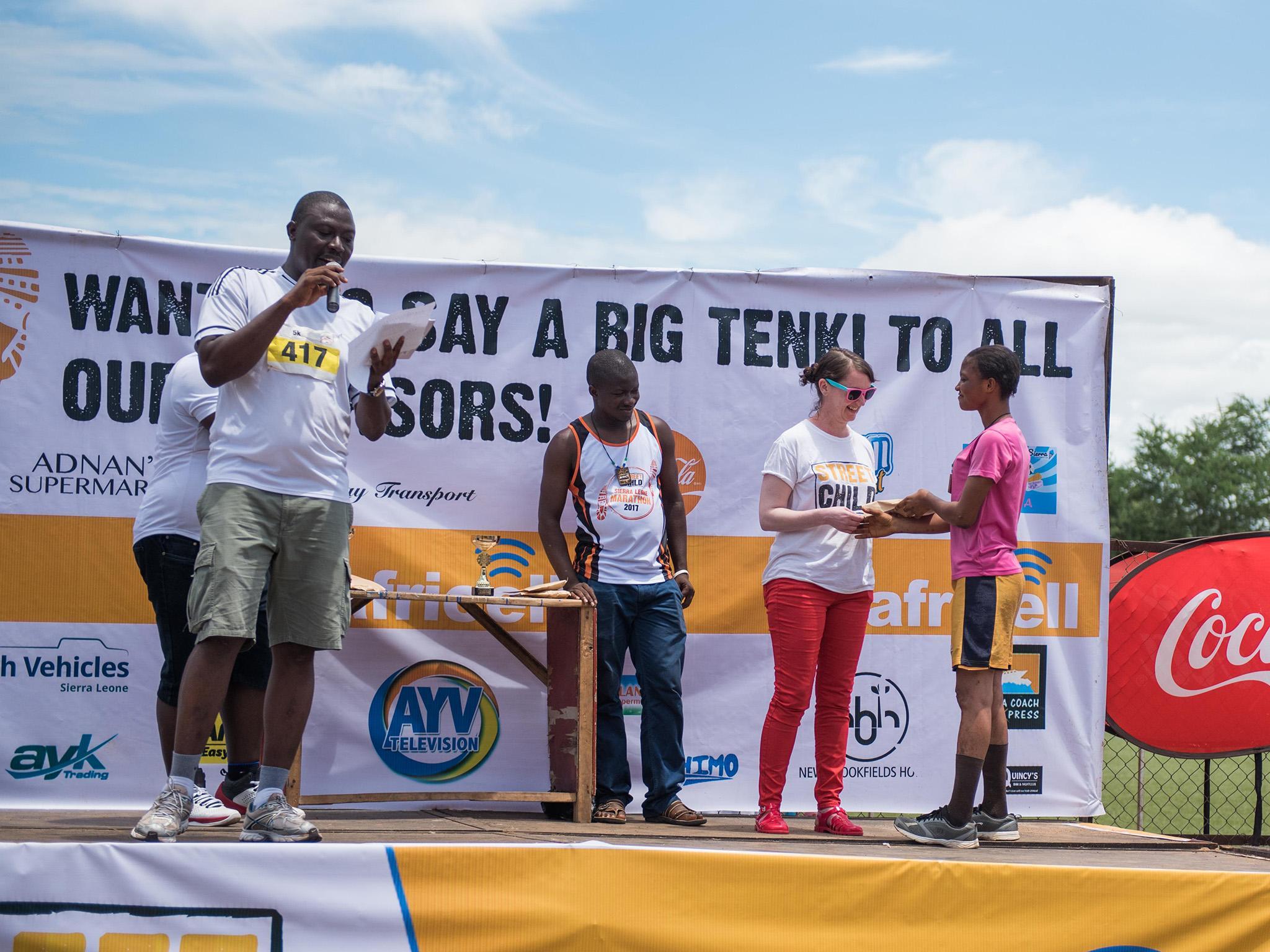
Mbalu’s toddler brother, who is suffering from malnutrition, is too ill to stand up. Mbalu herself sells rice at the side of the road to earn a bit of money to help the family and she’s been saving up to try and go back to school and finish her education. She told Pauline ‘I want to be a nurse like you’. Pauline returned to Sierra Leone to help bring personal closure and to run 10km as part of Street Child’s annual Sierra Leone Marathon. Pauline and two friends who worked alongside her at the Kerry Town centre all financed their own trips to take part in the race and have raised £3,000 to help Ebola orphans like Mbalu, something that brings Pauline some relief. Pauline said: ‘Street Child have identified all these orphans that they want to try and help. We were there treating the patients, but I didn’t really know what happened afterwards and what I’ve seen is that life is still pretty terrible for them. ’
‘I wanted to come back for a reason, ’ she said. ‘The more I thought about coming back, the more I wanted to, to put all the pieces together. ‘All the stuff that happened started here, and I wanted it to end here too. It’s good to finish with something positive after all the negatives that happened in between. I want to finish the chapter and move on. ’
Though she suffers bad joint pains in her left leg, a common side effect of Ebola, as well as numbness in her feet due to nerve damage caused by meningitis, Pauline completed the 10 kilometre course that weaves through the city of Makeni, Sierra Leone, being high-fived along the route by enthusiastic local children. She said: ‘The run was great. The route was very green and lush. There were low lying clouds so we couldn’t see the tops of the hills. It was really pretty and local children cheered us on. I suffer from leg weakness and joint pain and I can’t feel my feet so I didn’t intend on running any of the 10k but I did in the end because of the adrenaline. ’
After taking part in the Sierra Leone Marathon, Pauline went on to visit other parts of the country where the legacy of Ebola lives on. Places like a ghost village just outside Lunsar, where houses still lie empty after whole families succumbed to the disease. Their neighbours are too scared to enter the abandoned homes. Stiff clothes hang on washing lines inside and a mosquito net still hangs over a child’s bed, with toys left on the floor.
Gesturing to the ghost village that surrounded her, Pauline said: ‘When I see these Ebola sites, I feel sadness and pity. The place is so eerie, you can just image the burial team in their protective gear carrying corpses in body bags out of those houses. ‘It makes you want to help and support these people. This disease is by no means over, these things take years to recover from. ’
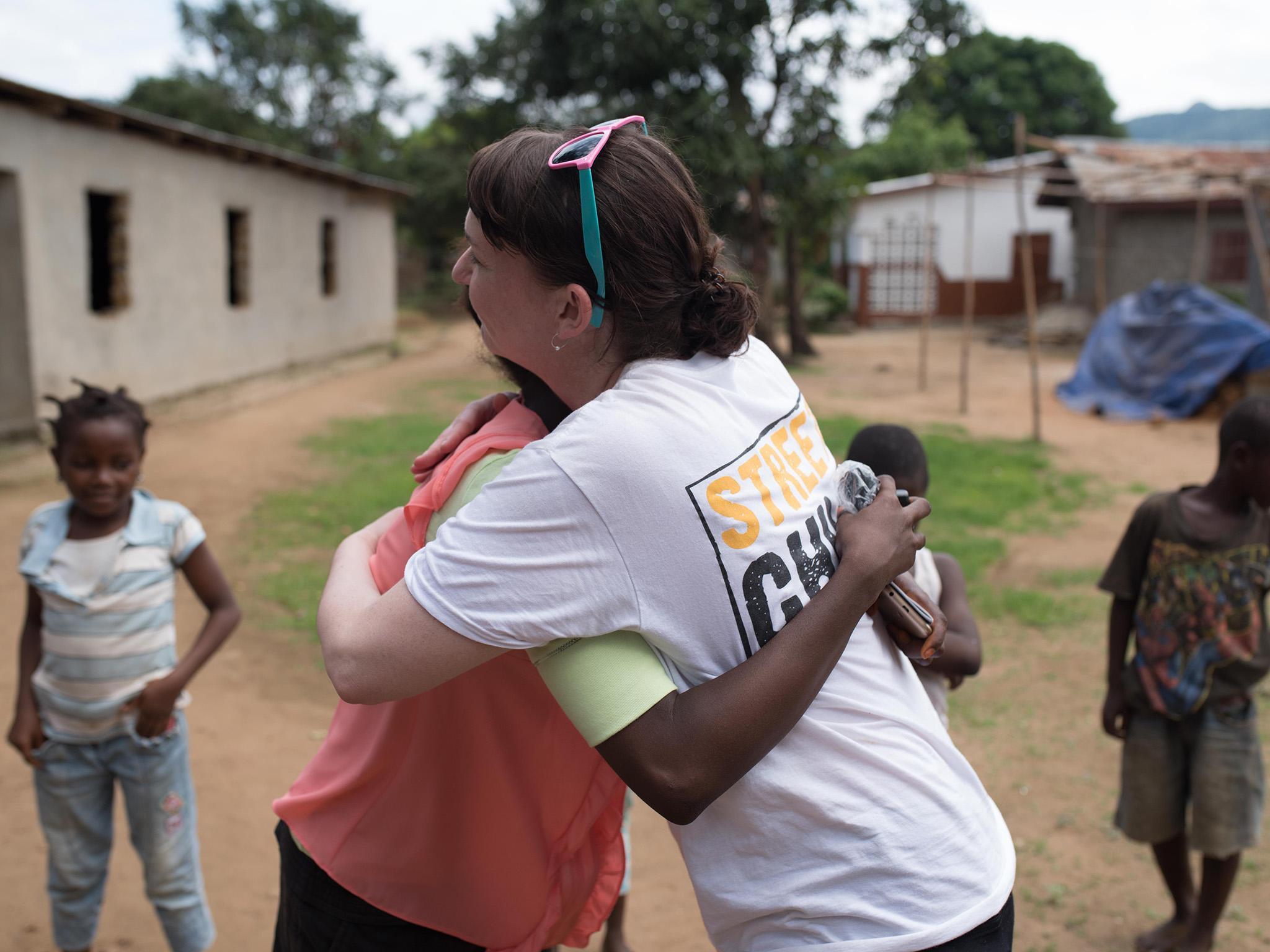
For many Ebola survivors in Sierra Leone, the nightmare of the epidemic’s impact is still a daily reality. ‘My father abandoned me soon after my mother died from Ebola, ’ said survivor Mabinty, now 17, who lives near Lunsar in a community that lost a third of its population to Ebola. Desperate, she turned to the streets to provide for her four younger siblings. She said: ‘After that [her mother’s death] I was struggling and I met a man and fell pregnant. I was 16 when I had the baby. Things were easy when my parents were alive. They always used to look after me and give me money to buy school materials and other things. ‘Now I have nobody to assist me. I miss my old life. I have my four younger siblings and my baby that I look after, along with my aunt. My aunt makes small money from selling groundnuts and palm oil. ‘Life is very hard now. ’
Mabinty added: ‘Pauline’s a good woman for coming back. Others would be afraid to return to the country. She came back because she knew that she’d left vulnerable people behind. If it was me I’d do the same. ’
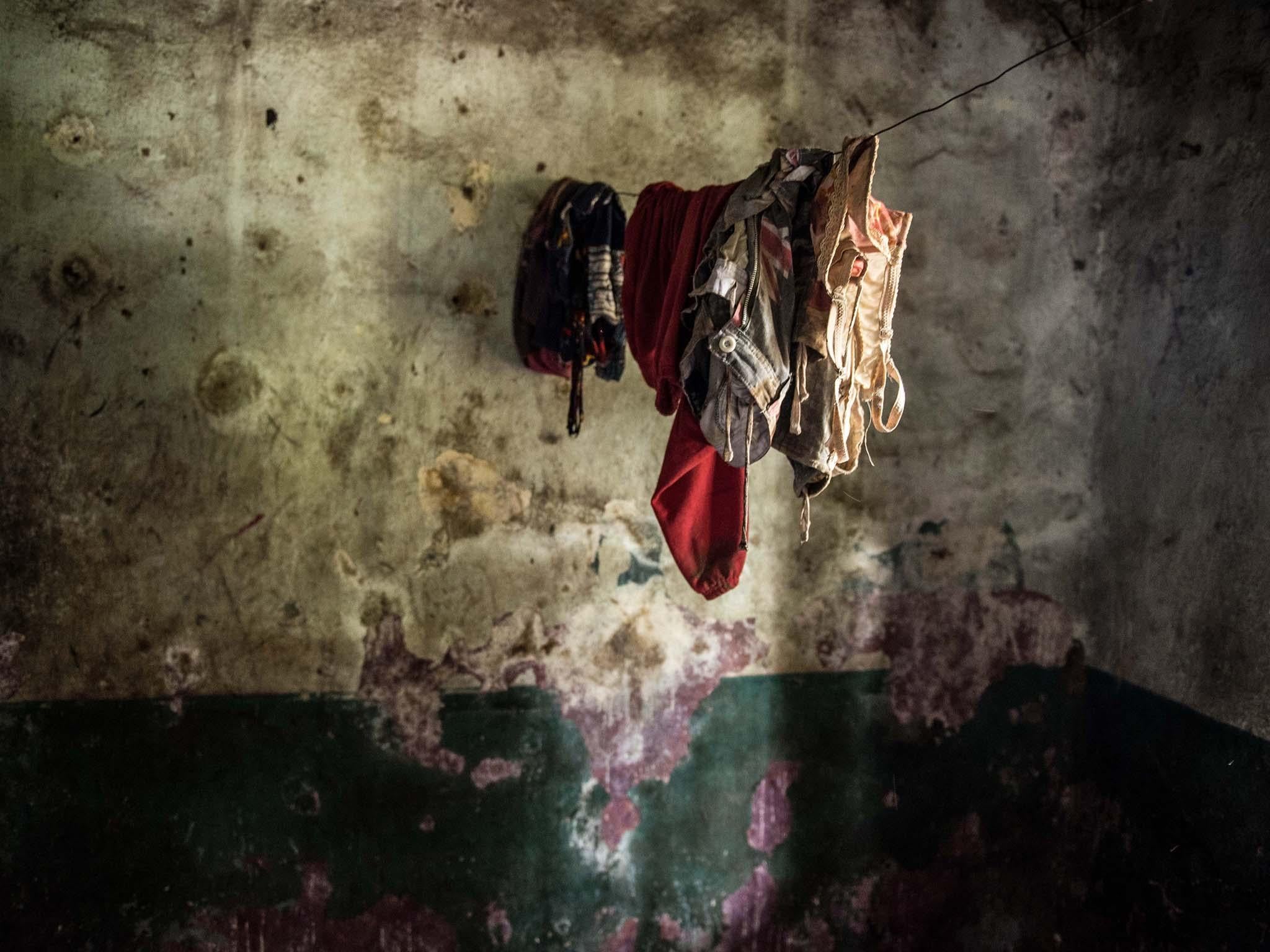
Ebola has increased poverty drastically for many families in Sierra Leone. Street Child CEO Tom Dannatt said: ‘The public funding post-Ebola is just not there. Pauline’s visit will help put the issue back in the public’s minds. ‘We’re still making a noise about the thousands of Ebola orphans who are still struggling. ‘They may have a roof over their heads but they are last in the line for food and school fees - especially if they’re a girl. Last year we ran a successful ‘Girls Speak Out’ appeal which was match-funded by the UK Government, enabling us to help over 2, 000 girls go back to school in post-Ebola Sierra Leone this year. Whilst it’s great that we’ve been able to help some girls like Mabinty, our social workers have identified a further 1, 400 Ebola orphans like Mbalu who are still facing a daily battle for survival. The work is far from over. ’
While the plight of Ebola orphans is no longer making international headlines, the few NGOs who have continued their work with Ebola orphans are warning that it is too early for the international community to move on. Just three weeks ago, World Food Programme and Street Child distributed emergency food to Ebola orphans in 1,000 desperate households. For Pauline, returning to see Sierra Leone two years on from Ebola has been an emotional rollercoaster but one that she says has been necessary to help close this chapter of her life.
She said: ‘I’m almost there – I’m getting towards the end of the trauma. It was just unfinished when I left here last time, I had always intended on coming back. It finishes that part of it and helps me move on. My hope is that more people will hear about Ebola’s forgotten orphans and want to help, that would be the best legacy that this trip could leave. ’
Sponsor Pauline’s run for Ebola orphans sierraleonemarathon2017.everydayhero.com/uk/pauline. To support orphans still in need of urgent help go to street-child.co.uk
Join our commenting forum
Join thought-provoking conversations, follow other Independent readers and see their replies
Comments